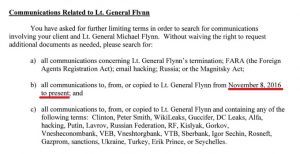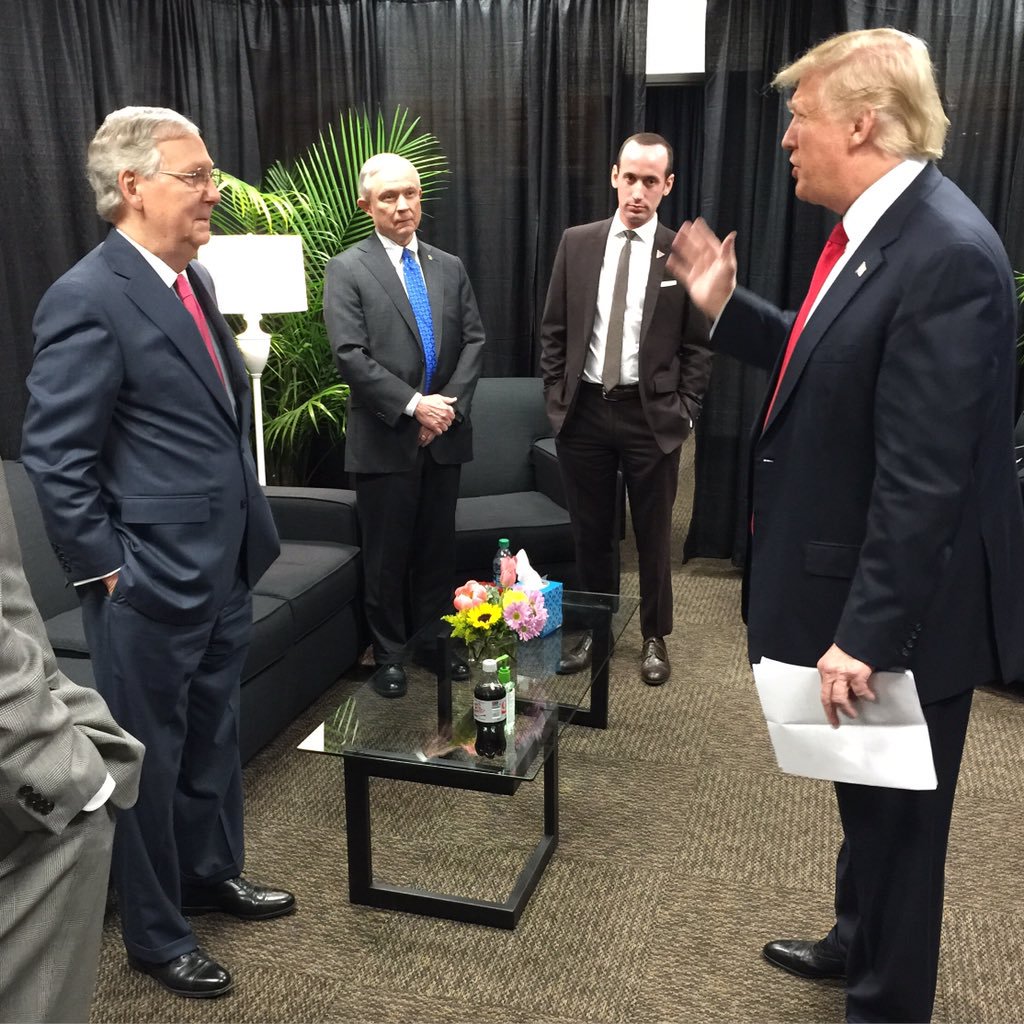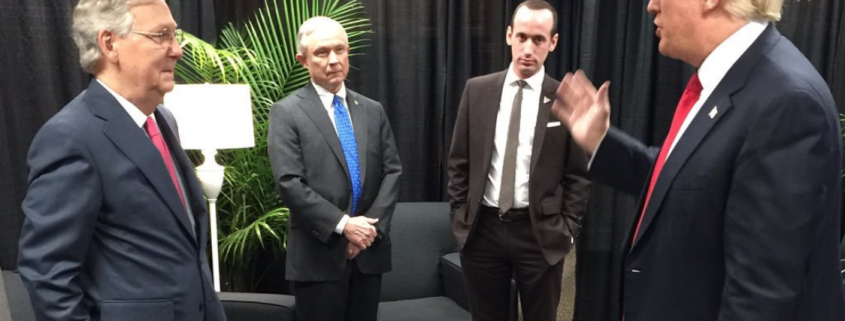As noted, the press has been focused on the Senate Judiciary Committee’s revelation that Jared Kushner failed to turn over several documents known to exist, which has led to more details about efforts by Aleksander Torshin to meet with people associated with the campaign.
Here are the things identified to be missing from Jared’s production to SJC.
In addition, there are several documents that are known to exist but were not included in your production. For example, other parties have produced September 2016 email communications to Mr. Kushner concerning WikiLeaks, which Mr. Kushner then forwarded to another campaign official. Such documents should have been produced in response to the third request but were not. Likewise, other parties have produced documents concerning a “Russian backdoor overture and dinner invite” which Mr. Kushner also forwarded. And still others have produced communications with Sergei Millian, copied to Mr. Kushner.
In response to the Feinstein letter revealing these details, Jared’s lawyer, the very capable Abbe Lowell, wrote back, scolding Feinstein (though the letter is also addressed to Chuck Grassley) for releasing her letter to the press. But in fact, Lowell’s letter is not responsive to four of the items laid out in Feinstein’s letter. And the way in which Lowell doesn’t respond reveals the complete inadequacy of the Intelligence Committee Russian investigations.
The four things (I noticed that) Lowell doesn’t address are:
- A request for a copy of Jared’s own copy of his SF-86 applications
- A privilege log
- Call records pertaining to some of the requests
- Communications “about” certain individuals
A request for a copy of Jared’s own copy of his SF-86 applications
Feinstein’s letter notes that Jared should have a copy of his SF-86 applications and asks for them.
However, if Mr. Kushner or his counsel retained copies of the forms, you should produce them. The SF-86 instructions explicitly advise the applicant to “retain a copy of the completed form for your records.” Moreover, with regard to your claim that the documents are confidential, while the Privacy Act limits the government’s authority to release the information provided to it, there is no restriction on your client’s ability to provide that information to Congress.
Lowell simply notes that SJC is pursuing this, and scoffs that Jared’s serially incomplete SF-86 forms might be relevant to the inquiry.
I explained to your staff that documents concerning the SF-86 are deemed government personnel records, and I know the Committee is pursuing these (again with whatever relevance they could possibly have to any real inquiry) from the proper channels.
A privilege log
Feinstein also asked that Jared work with the White House so he could release “certain documents” that might implicate executive privilege, with an eye towards providing a privilege log.
You also raised concerns that certain documents might implicate the President’s Executive Privilege and declined to produce those documents. We ask that you work with White House counsel to resolve any questions of privilege so that you can produce the documents that have been requested or provide a privilege log that describes the documents over which the President is asserting executive privilege.
While Lowell addresses documents that post-date the inauguration, he makes no comment about executive privilege at all.
Call records pertaining to some of the requests
Feinstein’s letter also notes that Jared included no phone records pertaining to some of the requests (she doesn’t say which ones).
You also have not produced any phone records that we presume exist and would relate to Mr. Kushner’s communications regarding several requests.
Lowell does not address that request at all.
Communications “about” certain individuals
Finally, and most interesting to me, even before Feinstein listed the known documents that Jared had failed to turn over, she noted that he had failed to search for communications about certain things.
For example, you limited your production in response to our second request in a manner that eliminates communications about the individuals identified in that request.[1] If, as you suggest, Mr. Kushner was unaware of, for example, any attempts at Russian interference in the 2016 presidential election, then presumably there would be few communications concerning many of the persons identified in our second request, and the corresponding burden of searching would be small.
[1] The Committee requested “[a]ll communications to, form, or copied to you relating to” certain individuals, but you stated that you “found no communications in which these individuals also appear in the to, from, or copy to lines of the communications.”
In fact, the three missing documents all might be considered such “about” communications, as they consist of forwarded emails adding further commentary.
Here’s where Lowell’s response gets really interesting. As with the request for call records, he doesn’t address the failure to search on communications “about” people at all. He doesn’t mention that he has failed to search for documents in the manner directed by the committee.
But for each of the missing documents, he explains why they wouldn’t be relevant in such a way that completely dodges the fact that, as communications “about” the persons in question, they definitely are.
A communication in which he was a copied recipient and was not about Russia contacts by him (or apparently by anyone else) was not responsive to any request about Mr. Kushner’s own contacts.
[snip]
The “Millian” email between Mr. Millian and a reporter, in which Mr. Millian is actually conferring with Michael Cohen and confirming that Mr. Millian has no relationship with the President, is also not one about contacts that Mr. Kushner, or really anyone, had that would be responsive to any relevant request.
[snip]
[of the Torshin email] Again, this was not any contact, call or meeting in which Mr. Kushner was involved.
[snip]
You can see there would be no reason for us not to provide such a clear expression that Mr. Kushner had no contacts with, nor was in collusion with, nor was pursuing any such relationship with Russia except that it was not responsive.
So not only does he offer disingenuous explanations for each of the missing documents — one after another he explains that these emails don’t involve any contact between Jared and the designated person — but he completely ignores that under the terms of the request, they were obviously responsive.
Of course, the only reason SJC learned of these emails is because the other participants in the email chains turned them over. But there are undoubtedly other emails or documents that are “about” these and presumably other requested individuals that others wouldn’t have been party to. And by ignoring the request for “about” documents, Lowell is basically completely blowing off providing those other documents, which would likely be even more interesting.
Just as an example, Jared could very well have had 100 other discussions “about” Wikileaks or Julian Assange with some unknown person, and Lowell’s incomplete search would have hidden it.
Now check out Lowell’s more general excuse for not turning over such documents:
With respect to the substance of your letter, let me start with the so-called “Missing Documents.” They are not missing at all. As you will note, after I spoke to your staff, I wrote a cover letter with our production. In that letter, I wrote: “We believe that our prior production [to the intelligence committees] contains the most pertinent documents to your inquiry into the June 9, 2016 meeting at Trump Tower, and related matters, and undercut any notion that there was collusion (or even any extensive interaction) between Mr. Kushner and Russia concerning the 2016 election.” The documents provided to those committees fully responded to their requests. That was why we said we would provide those documents to you first to see if anything else was relevant or new, and try to determine whether those documents satisfy your inquiry as well.
This production, which doesn’t include any documents about designated topics (including the June 9 meeting), satisfied the intelligence committees. That means the intelligence committees could not have asked for “about” documents (which is particularly ironic given that they’re both trying to find a way to help NSA turn “about” 702 collection back on). Which in turn means the intelligence committees likely have huge gaps in their understanding of Jared’s awareness of the Russian discussions.
And in addition to all his other contemptuous non-answers to Feinstein’s letter, Lowell says Jared shouldn’t have to sit for an interview with SJC because he already sat for 6 hours with the other committees, the committees that didn’t ask for “about” documents and therefore don’t have a complete picture of Jared’s involvement.
This is the scam that’s been going on for almost a year (which is probably why Michael Cohen has been dodging an interview with SJC too).
While his letter is otherwise totally unhelpful, it’s nice of Lowell to so clearly make evidence the inadequacies of the other congressional investigations.
Update: Perhaps Mueller is facing the same problem, because he just subpoenaed the Trump campaign for more documents, by keyword.
The subpoena, which requested documents and emails from the listed campaign officials that reference a set of Russia-related keywords, marked Mr. Mueller’s first official order for information from the campaign, according to the person. The subpoena didn’t compel any officials to testify before Mr. Mueller’s grand jury, the person said.
The subpoena caught the campaign by surprise, the person said. The campaign had previously been voluntarily complying with the special counsel’s requests for information, and had been sharing with Mr. Mueller’s team the documents it provided to congressional committees as part of their probes of Russian interference into the 2016 presidential election.








![[US Oil Fund ETF via Google Finance]](https://www.emptywheel.net/wp-content/uploads/2017/11/USOilFund-ETF_GoogleFinance_06NOV2017.jpg)